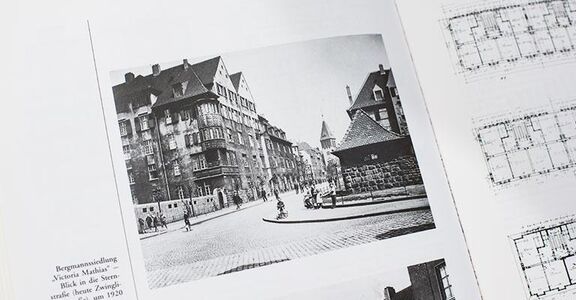Act reliably
Our Annual Report

In view of the fact that Vonovia was founded in 2015, at first glance it is still a young company. But thanks to its predecessor companies, more than 100 years of history are united under one roof. Three companies form the basis of Vonovia: GAGFAH, Eisenbahnerwohngesellschaften and Vereinigte Stahlwerke AG. It was not only the frequently similar social, economic and political environment that unified the predecessor companies, but it was also the issue of "creating living space" that has been a guiding principle for all of these predecessors throughout the decades. Vonovia continues to pursue this objective as a service provider for all aspects related to the home.
Three lines of development constitute the foundation of Vonovia SE: The Gemeinnützige Aktien-Gesellschaft für Angestellten-Heimstätten (GAGFAH), founded in 1918, the first railway housing companies (from 1918) and the housing companies of Vereinigte Stahlwerke AG, founded in 1926. They all had two things in common:
On the one hand, their aim was to create housing for their target groups – employees, railway workers and workers. On the other hand, they were non-profit organizations: The companies adhered to certain social criteria in the provision and management of housing and received tax advantages in return. During the period of National Socialism, the focus was on the armaments economy: Support was given above all to buildings that served the political goals of the regime.
To a certain extent, Vonovia's predecessors employed foreign workers, mainly from the Netherlands. As a result of the bombings during the war in 1945, around 3.6 million houses and thus a large part of the housing stock in Germany had been destroyed.
The reconstruction of Germany was an enormous challenge – not just for the construction industry. Until the 1970s, Vonovia's predecessor companies grew primarily thanks to the expansion of social housing construction and new industry impulses such as condominiums and satellite towns. In the mid-1970s, the housing shortage of the post-war period was considered officially over. International problems such as the oil crises led to negative developments in the global economy – and thus also in Germany, where unemployment figures rose. The problems had an impact on the predecessor companies, which had to reorient themselves and consequently focused their business on administration and maintenance. In late 1989, an important change for Vonovia's predecessors occurred with the abolition of the non-profit status for housing companies. The housing market experienced a surge of innovation: A construction boom ensued in the new federal German states, and the predecessor companies expanded their range to include residential services.
Around the turn of the millennium, international investors changed the German real estate market. Deutsche Annington and its owner Terra Firma acquired the railway housing companies in 2001 and became the largest German housing company in 2006 with the takeover of Viterra AG.
In 2004, GAGFAH passed into the ownership of the investor Fortress. Deutsche Annington and GAGFAH took over numerous housing portfolios throughout Germany. Deutsche Annington reorganized its internal structures, which, however, led to tenant complaints due to unsatisfactory services, among other things.
Following successful countermeasures, in particular with the establishment of its own craftsmen organization, the company went public in 2013. GAGFAH also struggled with negative headlines, but was also able to counteract this.
By 2014, the private equity companies Terra Firma and Fortress had withdrawn as owners. In 2015, following the merger of Deutsche Annington and GAGFAH, the company was renamed Vonovia. Today, the company regards itself as a home service provider and also operates at a global level.
In 2017, the company stepped onto the European market: Austrian company conwert, which owns 24,500 residential units, became Vonovia SE’s first foreign subsidiary. The following year, it was joined by BUWOG, also based in Austria, which owns 49,000 residential units. Vonovia was also able to secure a share of the market in Sweden: Victoria Park became a Vonovia subsidiary in 2018, followed by Hembla in 2019. Through these acquisitions, Vonovia is also making sustainable investments in affordable housing in other European countries.
Finally, in October 2021, the company successfully acquired Deutsche Wohnen, a development welcomed by the management of both companies. Following the takeover, Vonovia now owns more than 533,000 residential units in all attractive cities and regions of Germany, Sweden and Austria. With the combined forces of Germany’s two largest residential real estate companies, Vonovia and Deutsche Wohnen, and its subsidiaries abroad, Vonovia SE is striving to actively address the challenges faced by the housing market in a responsible way – first of all by focusing on protecting the climate and creating new, affordable housing.



